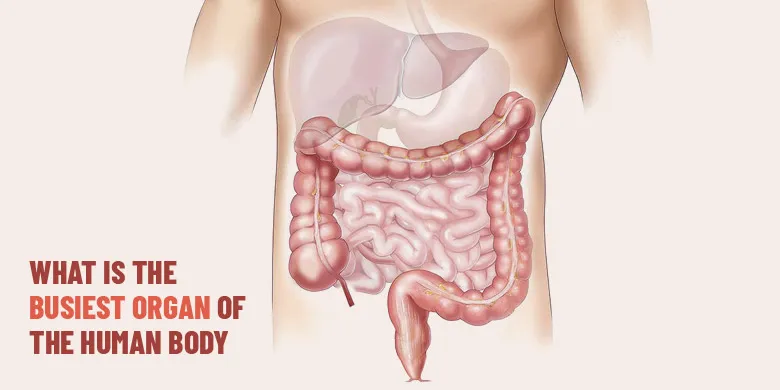Which is the busiest organ of the human body?

It has been quite difficult, even for scientists and researchers, to provide an unambiguous answer to the question “What is the busiest organ of the human body?” What is the precise definition of the busiest organ? If the busiest organ is the one which works round the clock without stopping even for a second, then there are many organs which work ceaselessly from your birth till the last breath.
The major organs of the body, like brain, heart, liver, lungs and skin are found busy executing their assigned jobs all the time without taking rest for a while. Some organs, like brain, keep on working silently and mysteriously without making any observable movements. On the other hand, there are organs like the heart and lungs, which make noticeable movements while doing their assigned tasks.
Liver’s Jobs:
The largest gland and biggest internal organ of the body, your liver is a whole laboratory in itself.[1]It works tirelessly as the key organ of the sanitation system of your body and the primary channel of elimination.
Elle Eriksson (2014), in the book “Top Ten Best-Ever Healthy Weight-Loss Tips” claims that the liver is responsible for performing over 500 different functions in the body. It serves as the major site for detoxification and fat metabolism. In addition to dealing with everyday toxins and pollution, your liver also comes under the burden of prescription and other drugs. Meanwhile, it also has to bear the brunt of junk food, unhealthy fat, alcohol, tobacco, pesticides, preservatives, chemical food additives and stress. So, if you love your liver, you need to avoid all these things whenever possible.
In their book “Feed your best friend better: easy, nutritious meals and treats for dogs”, Woodford et al (2012) summarize the functions of the heart as the production facility, warehouse, and an all-in-one waste treatment plant.The liver not only converts the nutrients from food into usable substances but also stores them until your body needs them. In fact, liver is the main storage centre of the body.
According to Lee (2004), your liver produces and excretes one pint or more bile into the small intestine which is used for digestion. Secondly, while responding to insulin, it regulates the right amount of sugar in the blood. Thirdly, the liver makes three proteins for the blood, namely, albumin, globulin and fibrinogen.
The fourth important job of the liver is to form urea from a nitrogenous substance which is produced in the liver during the digestion of protein. The urea is excreted out of the body through the urine. From these facts, it is understandable that when you eat too much proteins, it poses an extra burden on the liver as well as the kidneys.
Heart’s Jobs:
Measuring about the size of a fist, your heart is the natural pump of the body which keeps on collecting deoxygenated blood from the body tissues and providing them with fresh, oxygenated blood all the time without stopping for a second.
As a central organ of the cardiovascular or the blood circulatory system, the main job of the heart is to pump the blood throughout the body. It performs the act of pumping around 70 times a minute and over 100,000 times a day. With each beat, it can squeeze about 60 millilitres of the blood through the circulatory system.
In an average lifetime, the hearthas topumpabout 184 litres of blood which is transported to tissues through blood vessels.Measuring nearly 80,000 miles in their collective length, the blood vessels are assigned the task to carry the nutrients and oxygen to all the individual cells located throughout your body. According to Miller (2016), such a hectic and tiresome job makes the heart the busiest organ which has toundergo the greatest mechanical stress.
Brain’s Jobs:
Susan Augustine, in her book “The Hungry Brain: The Nutrition/Cognition Connection”argues in favour of brain as the busiest organ of the body. She calls it the busiest chemical factory of your body that never rests. Comprising just around 3% of the total body weight, it utilizes about 30% of the body’s fuel or the blood sugar (glucose).For its proper functioning, your body needs to maintain a constant flow of glucose, amino acids, minerals and vitamins to the brain in just the right quantities.
All the 80 organs and around a dozen organ systems in the body are instructed, directed and assisted by the brain for the proper execution of their functionalities.
The processing of data from senses (hearing, vision, smell, taste and touch), initiating and coordinating movements, maintaining the balance of body, producing language, carrying out learning, storing information (memory), controlling emotions and moods, and dreaming, etc. are just some of the functions that are to be executed by the brain (Portocarrero, 2007).
The Busiest Organ of the Body:
After comparative analysis of different major organs of the body, you can logically vote in favour of the brain as the busiest organ of the body. Justine (2007)also regards the brain as the busiest organ.[10]As the master organ and control centre for all the body functions, it has to remain vigilant to manage, direct and coordinate all the activities.
The death of this organ is considered as the legal death of an individual. However, you can broadly define death as the permanent cessation of the integrated functioning of the human body as a whole.According to operational definition of death, it is the total cessation of the brain function which may serve as a reasonable detriment of the permanent cessation of the integrated body function.
If your brain stops working, all the organs and systems will lose control and stop working. The transplant of many other organs is possible but the brain transplant has the dismal chances of success. So, you need to take care of the brain more than any other organ or part of the body.


